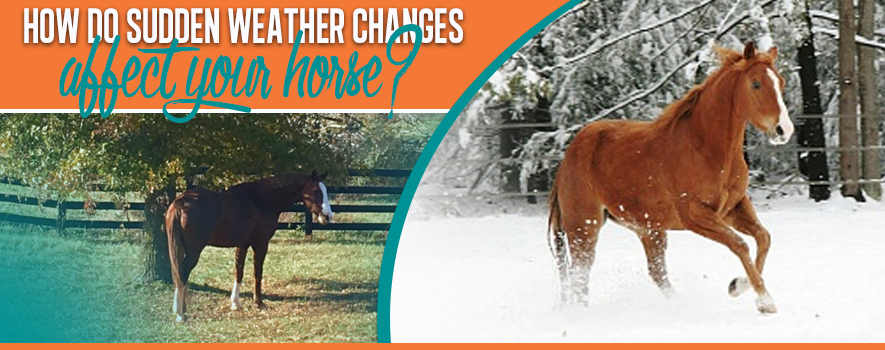 Drastic, sudden weather changes are often experienced across the United States. One day it’s sunny and 70 degrees, and the next it’s windy and the temperature has dropped 20 or 30 degrees. Although no study has scientifically proven a link between weather and illness in horses, extreme weather changes are known to cause colic.
Drastic, sudden weather changes are often experienced across the United States. One day it’s sunny and 70 degrees, and the next it’s windy and the temperature has dropped 20 or 30 degrees. Although no study has scientifically proven a link between weather and illness in horses, extreme weather changes are known to cause colic.
There are a variety of reasons why a horse may start to feel sick soon after a drastic change in weather. A horse’s thermal neutral zone is defined as the temperatures at which adequate body temperature can be maintained without any extra energy expenditure. The lower and upper limits of the thermal neutral zone depend on what the horse is accustomed to, the body condition of the horse, and if they have a full coat or are clipped. The lower limit is generally between 10 and 45 degrees Fahrenheit and the upper limit is generally between 65 and 85 degrees Fahrenheit.
Outside of their thermal neutral zone, horses must work to either lower or raise their body temperature. This alone puts a burden on the horse. In addition, the weather changes often lead to dehydration, either because the horse will not drink as much in very cold weather or because the horse is sweating excessively to lower the body temperature in hot weather. Dehydration causes the contents of the colon to become dry, which can cause blockages in the gut and result in impaction colic.
Extreme weather changes also tend to limit the horse’s activity level. For example, during hot weather, the horse will limit its activity to help prevent further overheating and during cold weather, the horse will limit its activity because it usually remains in a shelter or stall. Inactivity is largely responsible for colic episodes. In fact, a recent study found horses with no turnout were three times more likely to colic than those that were turned out frequently.
Severe weather is also associated with changes in barometric pressure and although the effect of barometric pressure on horses is not well studied, rapid changes in barometric pressure are known to trigger headaches and migraines in humans. Whatever the cause, next time the weather takes a turn make sure you are prepared! Keep an eye on how much water your horse is consuming and consider providing soaked beet pulp or chopped forage to increase water consumption. Additionally, try not to eliminate your horse’s turnout too often, even when the weather isn’t cooperating. And, of course, for extra protection, administer a prebiotic like Amaferm®. Amaferm is available in all Vitalize® products, giving you extra flexibility in administration.


